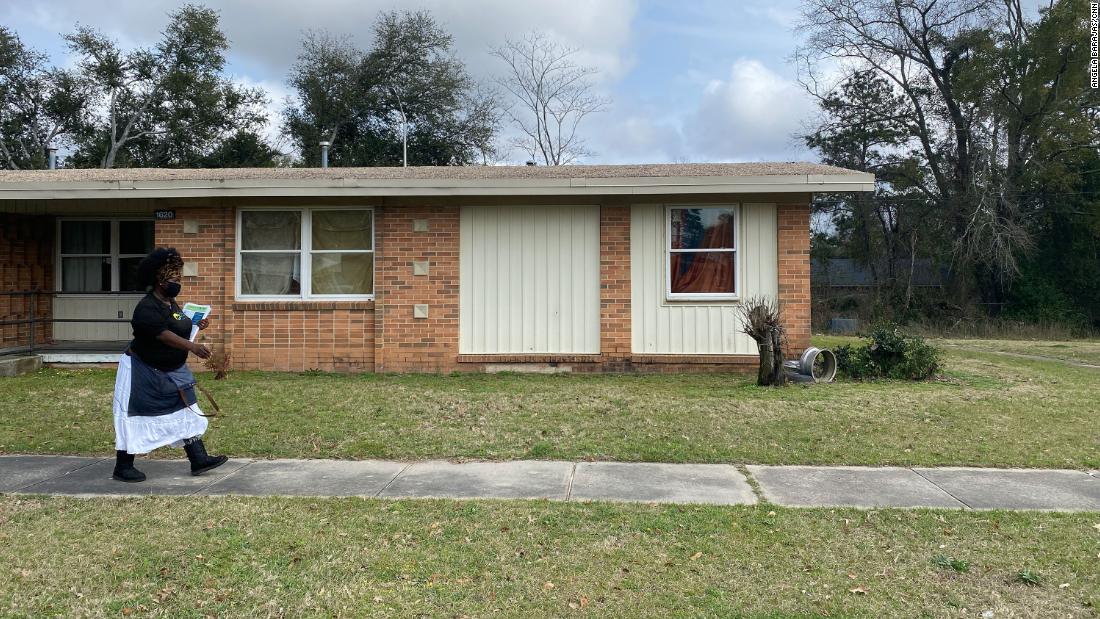“I am tired of losing grandparents, grandparents, grandparents and some of our young children too.”
Consecutive funerals and a marathon proved deadly, as the virus spread rapidly across Albany, Georgia. The predominantly black city quickly became a hot spot in the beginning of the pandemic.
As demand for the coronavirus vaccine continues to exceed supply, the city has taken a new approach to vaccinate the most vulnerable.
Harris, a city recreation supervisor and lifelong resident, examines poor and disadvantaged neighborhoods to raise awareness about local vaccine resources.
On a recent sunny afternoon, Harris and a few other volunteers traveled for miles around South Albany knocking on hundreds of doors, handing out flyers informing residents of a nearby vaccination location over the weekend.
Along the way, familiar faces light up as they see Harris crossing the neighborhood. “There is always someone trying to help someone, showing a positive way of doing something,” says Jeremiah Heart, a Harris neighbor.
He’s only a year before he turns 65, which leaves him out of the vaccine’s eligibility for now. Still, he is sure he wants the vaccine. “I never hesitated at all about it, always wanting something to keep me going,” says Heart.
However, these beliefs are not shared by everyone in the community.
“My daughter doesn’t want me to take it and I’m a little scared, but I’ll see. I don’t want it to make me sick,” said Willie Heath after Harris delivered a leaflet to his door.
Harris remains relentless, relying on his faith, warmth and reliability to vaccinate his neighbors.
“We are being hit harder with this, and we are trying to talk to them [at risk communities] so they can go out and get the vaccine. Therefore, we can at least prevent some of them from dying. It is a choice, whether they choose to get the vaccine or not. But we are just doing our job by encouraging them and talking to them. It’s a choice. “
A grassroots effort to build trust
Heard, also a native of Albany, began to see racial disparities in vaccination numbers. Data from Phoebe Putney Health Systems show that white people are being vaccinated at more than twice the rate of black residents.
“We knew there were several reasons for this disparity, whether it was the social determinants of health, access to our vaccination center, said Heard.
He also knew that he and his colleagues had to do something to correct the distrust that some people in the African American community had about the medical establishment.
A few days later, the occasional pop-up site opened with some expectation with only a dozen appointments scheduled in advance. The biggest challenge was not to spread the message, but to dispel the suspicions of the African American community.
“It’s just fear, the fear of [the] unknown, just unknowingly and afraid to ask, “said Alberta Charlot, a licensed practical nurse at Phoebe Putney.
Charlot was on the scene as the elderly and their caregivers slowly arrived. She had had her first injection a few days earlier, after deciding it was the best thing to do for her and her family.
An elderly woman stopped with her grandson after driving by and seeing the vaccination site. She called her three sisters to come and take the picture. All three refused, including one on dialysis.
The final count of the day was less than 50 vaccines in the arms.
“This job is not easy. We are in a predominantly African-American community that has some very valid reasons for perhaps not trusting health, not trusting science. So it is days like this that we hope to build a little trust in,” Scott Steiner , president and CEO of Phoebe Putney Health System, told CNN.
“People may see their neighbor receiving someone they respect, and that makes them more comfortable.”
